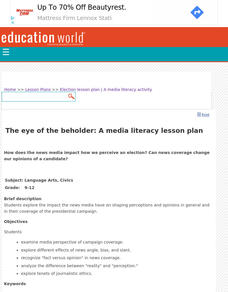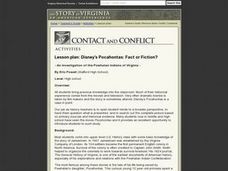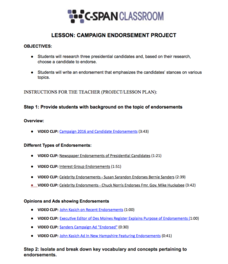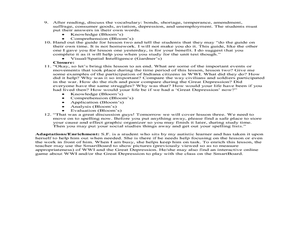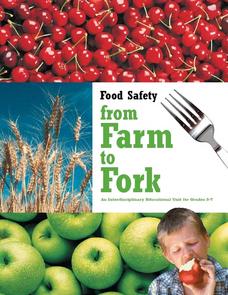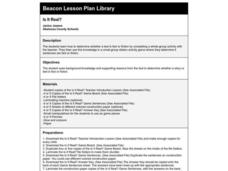Curated OER
Chalkboard Challenge: Literary Terms
This interactive PowerPoint simulates a "Jeopardy" game that addresses figurative language, cause and effect, and other literary terms. Players can chose which category and amount they would like to play on the Game Board.
Curated OER
The Eye of the Beholder: A Media Literacy Activity
Learners explore the impact the news media have on shaping perceptions and opinions in general and in their coverage of the presidential campaign.
Curated OER
Mr. Lincoln's Whiskers
Learn about the events that helped shape the United States of America. Elementary schoolers explore the Civil War with six different activities. Each activity has a different focus: literature connections, primary sources, vocabulary,...
Curated OER
Disney's Pocahontas: Fact or Fiction?
Did you know that Pocahontas was 12 when Jamestown was established? Did you know that she later married John Rolfe? Did you know that she lived in London for two years? Did you know that she died of small pox? Class members study the...
C-SPAN
Campaign Endorsement Project
So many politicians, so many endorsements! Learn to differentiate between facts as well as the process of endorsements with an informative resource. Class members watch current endorsement videos, research candidates from three different...
Serendip
Golden Rice – Evaluating the Pros and Cons
More than half the world's population eats rice as a daily staple ... imagine if that rice could prevent illness. Scientists genetically engineered rice to include vitamin A for just that purpose. However, room for debate still exists....
The New York Times
The Careful Reader: Teaching Critical Reading Skills with the New York Times
The 11 lessons in this educators' guide focus on using newspapers to develop critical reading skills in the content areas.
Houghton Mifflin Harcourt
Animal Habitats: Extra Support Lessons (Theme 4)
The activities and exercises in this packet, the third in the series of support materials for the Houghton Mifflin Harcourt thematic units on animal habitats, are designed for learners who need extra support with the basic...
News Literacy Project
Fighting Falsehoods on Social Media
It's time to stop misinformation in its tracks. Scholars take an online quiz to see how well they understand social media platforms' policies on spreading false information. After taking the quiz, pupils receive a score with an...
Curated OER
bbc news: school report
In this journalism worksheet, students choose a subject for a news report. They create a list of three people they would like to interview. They write 3 questions to ask, and indicate if the question relates to a fact or opinion.
Curated OER
Observation
Students study the different kinds of observation: fact and opinion. In this observation lesson students complete an activity that allows them to use their senses to make observations.
Curated OER
Whose Neighborhood is It? Whose America is This?
Students use electronic resources to study immigration issues, analyze immigration issues dealing with security, economics, lawfulness, culture, and human rights, and discuss possible solutions. Students then express their opinions by...
Curated OER
Recognizing Bias
This PowerPoint outlines methods for recognizing bias in various forms of media. The presentation defines loaded words, stereotypes, and one-sided arguments as types of bias and also highlights the characteristics of facts and...
Pennsylvania Department of Education
Analyzing Key Ideas and Details in Nonfiction
Students explore nonfiction texts. In this language arts lesson, students read a nonfiction text and make predictions. Students identify facts and opinions in the text and draw conclusions as they read.
Curated OER
WWI & Depression
Fourth graders describe WWI influence in Indiana. In this guided reading instructional activity students read about the participation of Indiana citizens during World War I. Students give examples of event that changed life in Indiana...
Pennsylvania Department of Education
What Comes Next?
Students listen to various books that contain a sidebar of illustrations and practice making predictions about events in each story. In this what comes next instructional activity, students differentiate fact from opinion across...
Curated OER
What is News?
Eighth graders discover elements that make a story newsworthy. They play an online game about newsworthy stories and complete a worksheet with partners. They also examine the difference between facts and opinions.
Curated OER
"The Story of Ruby Bridges"
Third graders examine the role of Ruby Bridges in the U.S. Civil Rights Movement. They listen to the teacher read the book "The Story of Ruby Bridges" by Robert Coles, identify what is fact or opinion in the story, and sequence events in...
Curated OER
Food Safety From Food To Fork
Young scholars are introduced to the concept of food safety. In groups, they distinguish between fact and opinion and cause and effect while participating in a board game. They write an essay about what knowledge they gained and review...
Curated OER
Writing My Own Story
In this writing my own story worksheet, 2nd graders follow ten fact and opinion writing prompts to write a simple story about themselves.
Curated OER
Reading The Flag Maker
Students explore The Flag Maker. In this reading comprehension lesson plan, students listen to the book The Flag Maker, making predictions and answering questions during the reading. Students locate facts and opinions within the book and...
Curated OER
Is It Real?
First graders see how to determine whether a text is fact or fiction by completing a whole-group activity with the teacher. They use this knowledge in a small-group station activity game where they determine if sentences are fact or...
Curated OER
Conventions: Strong Verbs
Fifth graders practice using strong verbs. In this conventions lesson, 5th graders brainstorm words to complete sentences and list lively and exciting verbs. Students act out meanings of certain words. Students come up with new ways to...
Curated OER
What Is the Nature of Science?
Students distinguish between scientific and everyday meanings of key words-theory, hypothesis, law, fact-and use in context. They recognize the variables that affect observation, data collection, and interpretation. They discover the...
Other popular searches
- Fact Opinion Lesson Plans
- Fact and Opinion Passages
- Fact Opinion Worksheet
- Fact and Opinion Lessons
- Teaching Fact vs. Opinion
- Fact and Opinion Worksheets
- Teaching Fact and Opinion
- Fact and Opinion Games
- Reading Fact and Opinion
- Fact and Opinion Keywords
- Identifying Fact or Opinion
- Fact Opinion Quiz



